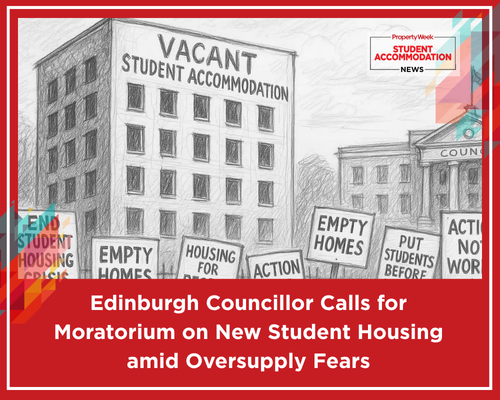
Edinburgh Councillor Calls for Moratorium on New Student Housing amid Oversupply Fears
Edinburgh: An SNP councillor has proposed banning new purpose-built student accommodation projects, citing a potential market bubble and community opposition, as officials consider converting private student flats for homelessness relief and grapple with the impact of rent control on investment.
An Edinburgh councillor has called for a ban on new student housing developments in the city amid growing concerns over an oversupply of private student accommodation. The city already hosts over 20,000 beds in private student halls, with new projects regularly receiving planning approval. SNP councillor Danny Aston warns the market may be in a bubble on the brink of bursting, potentially leaving Edinburgh scarred by unoccupied student blocks.
Cllr Aston has proposed a motion for a moratorium on new purpose-built student accommodation (PBSA) projects, drawing on Glasgow City Council’s previous effective ban on such developments from 2019 to 2021. He argues the city needs time to assess the impact of financial difficulties in higher education and shifting international relations, particularly cooling ties with China, which has historically supplied a large share of international students, especially one-year master's students who drive demand in the private sector.
The high cost of private student housing—often starting around £800 to £900 a month for a shared room and rising for studios—has attracted criticism from local residents who see these developments as exacerbating the city’s housing crisis rather than alleviating it. Many objections have been lodged against recent PBSA proposals, including a site in Dalry surrounded by seven existing student blocks within 500 metres and a large 191-bed development in Jock’s Lodge that drew over 1,000 objections despite gaining approval.
Despite this, Edinburgh’s current development guidelines still support PBSA projects, creating tension between planning policies and local community concerns. Cllr Aston’s motion aims to create breathing space for the council to better understand these conflicting pressures. If passed, council officers would be tasked with producing a report by September, which would also investigate why Glasgow’s moratorium ultimately ended.
In addition to calls for a development pause, Edinburgh Council has recently suspended its housing allocation policy and is considering buying existing private student housing blocks to convert them for use by homeless households. This strategy aims to quickly increase accessible housing stock while longer-term solutions are explored.
Meanwhile, recent rent control legislation in Scotland has complicated the investment landscape for PBSA. The inclusion of student accommodation in rent control measures has reportedly caused some developers to shelve projects or seek alternative schemes, sometimes switching from Build-to-Rent developments to student blocks. The cap on rent increases, originally set to zero percent and later raised to three percent, has discouraged investment in the broader rental market, with potential knock-on effects for housing supply and affordability.
Edinburgh’s approach to student housing is also shaped by regulations limiting the conversion of existing housing into PBSA, with a 50 percent housing requirement intended to address the city's wider needs. However, critics argue this policy unfairly restricts student accommodation availability, forcing wealthier students to compete with lower-income peers for limited, more affordable housing. The differing locational needs of students and families further complicate planning decisions, as students prioritise proximity to universities and nightlife, while families seek nearby schools and amenities.
Recent council decisions reflect increasing scrutiny of student housing proposals. Plans for new student flats at the former Tynecastle High School site were rejected following concerns about noise and odours from an adjacent distillery, with local groups advocating instead for affordable residential housing. Similarly, proposals for student accommodation in Leith’s conservation area were turned down over fears of negative impacts on the area's character and visual amenity.
As Edinburgh grapples with balancing the demands of its student population, housing affordability, and community preservation, the debate over the future of purpose-built student accommodation is intensifying. The outcome of the upcoming full council meeting and the proposed moratorium could mark a significant shift in how the city manages this delicate equilibrium.

